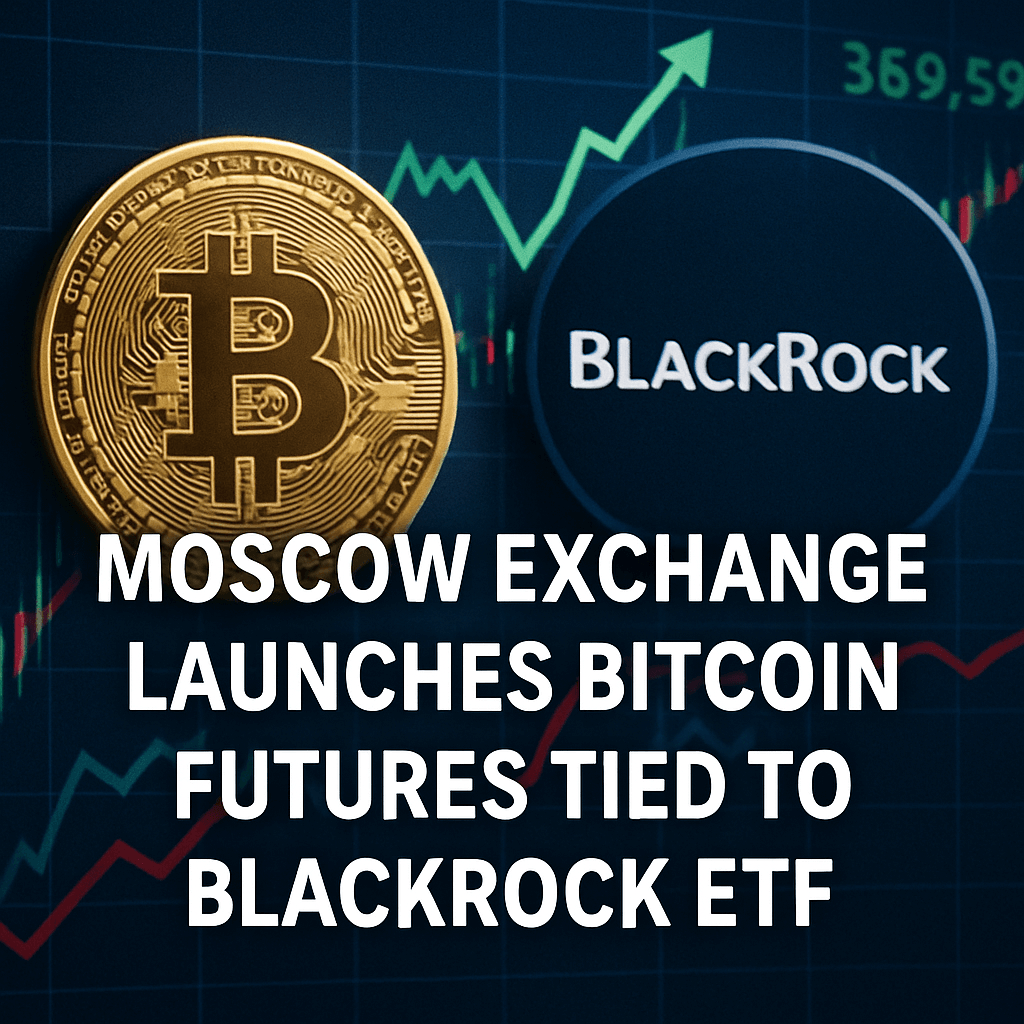Moscow Exchange Launches Bitcoin Futures Tied to BlackRock ETF

The Moscow Exchange (MOEX), Russia’s primary trading venue, has officially launched Bitcoin futures contracts that track the performance of the BlackRock Bitcoin ETF (iShares Bitcoin Trust ETF). This strategic move marks a significant step towards the gradual integration of cryptocurrencies into the Russian financial market, facilitating exposure to Bitcoin’s price fluctuations while maintaining regulatory oversight.
Details of the Bitcoin Futures Contracts
These Bitcoin futures contracts are priced in US dollars per lot, with settlements executed in Russian rubles, enabling local traders to engage with Bitcoin’s price dynamics without accessing foreign cryptocurrency exchanges. This structure is particularly crucial for maintaining capital within Russia while deriving benefits from global cryptocurrency market movements.
Each contract will have a quarterly expiration cycle, with the initial contracts set to mature in September 2025. The limited access, which confines trading to qualified investors—including major banks, hedge funds, and authorized financial entities—indicates the exchange’s intention to mitigate risk exposure by confining engagement to established financial players. Ordinary retail investors will not have access to these futures, reflecting a cautious approach in light of the volatile nature of cryptocurrencies.
Regulatory Oversight and Risk Management
The Bank of Russia endorsed this initiative in mid-2025, signifying its readiness to regulate crypto-related derivatives while still cautioning domestic financial institutions against engaging in direct Bitcoin transactions. The central bank’s stance appears to be a balanced approach, allowing investment in structured financial products tied to cryptocurrencies while aiming to shield investors from the full risks associated with direct crypto trading.
This regulatory framework ensures that reputational risks and potential financial instability are limited to professional investors who are presumed to have a greater ability to absorb potential losses.
Local Settlements and Currency Risk Mitigation
The choice to denominate these contracts in US dollars but to settle trades in Russian rubles serves as a buffer against foreign exchange volatility. This dual-currency approach allows traders to capitalize on Bitcoin values in a familiar context while cushioning the operational impacts of fluctuations in the forex market. Traders can effectively hedge their positions in rubles, which is particularly advantageous in an era of increasing economic sanctions and capital flow restrictions affecting Russia.
Implications for Broader Cryptocurrency Adoption in Russia
As Russia continues to explore digital assets, the introduction of these Bitcoin futures may catalyze broader acceptance of cryptocurrencies within its financial systems. With Sberbank, the nation’s largest bank, also venturing into the crypto space by offering structured bonds linked to Bitcoin’s performance, there appears to be a growing recognition of the potential bolstering of investment strategies through crypto-related financial products.
However, this cautious opening is underpinned by a lingering wariness within governing bodies regarding the inherent volatilities that characterize the cryptocurrency market. The central bank seems keen to manage both investor interests and national financial stability.
Expert Opinions on the Future of Crypto in Russia
Industry analysts express optimism about the implications of MOEX’s Bitcoin futures for the Russian investment landscape. For instance, Dmitry Golovanov, a financial analyst at an independent think-tank, states, “This move signifies that Russia is prepared to engage with the global crypto economy, provided it can impose adequate regulatory structures to protect investors. It remains to be seen whether broader acceptance among retail investors will spur once regulatory frameworks evolve further in response to this pilot program.”
Given the volatile history of Bitcoin and other cryptocurrencies, the establishment of regulated futures trading could also pave the way for more intricate financial products related to digital assets in the future. As the boundaries between traditional finance and digital currencies blur, Russia’s cautious steps into futures trading may serve as a model for other nations observing the evolving cryptocurrency landscape.
Featured Image: Moscow Exchange Launch (Source: Lonely Planet). Chart Source: TradingView